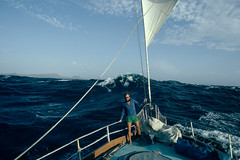:I’m convinced," writes science educator Andrew Revkin, "that there is vast untapped potential to use the Web and other means to build global awareness and meaningful relationships. Here’s some evidence. While giving a talk at Linfield College in Oregon in September, I learned of a professor of U.S.-Russian relations at another school who, on his own and with no extra budget or bureaucracy, recently linked his course through Web video with another course in U.S.-Russian relations in St. Petersburg, Russia. The same could be done for courses in climate policy, linking North and South, and even within schools. Imagine parallel deconstructions of climate legislation by, say, political science students and climate science students, using an online document dissector — essentially a more sophisticated, layered variant of the speech and document annotations done here on Dot Earth."
"The core of my work at Pace University will be the creation of a classroom and online course that, in essence, is an expansion of Dot Earth. As is the case here, the prime framing question explored each year by students will be: 9 Billion People + 1 Planet = ? This course will use mechanisms I tried in a seminar I taught a few years ago at the Bard Graduate Center for Environmental Policy. At Bard, for certain core assignments, students were divided into groups taking the approaches of different stakeholders in the drama of human development on a finite planet.
At Pace, I envision teams of students taking on the stance of techno-optimists and libertarians on one side and proponents of steady-state economics and growth limits on the other. Depending on the issue, they could be the Global North and South, or “ Guardians of the Future” versus interests of today. For discussions of the science, they would critically examine the role of “real” skepticism and the perils of oversimplification and advocacy when science meets the media and politics. I’d love to think that each year this course could produce a Web-based wiki-style product and/or printable book memorializing the journey."
"Lately, I’ve been describing the kind of inquiry I do on Dot Earth as providing a service akin to that of a mountain guide after an avalanche."
skip to main |
skip to sidebar
For students and parents who love education and exploration of the social sciences . . .
Search This Blog
Followers
Blog Archive
-
▼
2009
(379)
-
▼
December
(33)
- 2010: Year of the tiger
- Andrew C Revkin, NY Times science reporter, blogge...
- Copenhagen World Climate Change Conference opening...
- Cars of the World presentation . . .
- Intro to Deutschland
- Major parts of the British Empire
- The ancient, universal and positive nature of the ...
- British Empire presentation
- Semester book report due Mon, Dec 14: 15 pts and 1...
- Semester exam in geography: 100 multiple-choice qu...
- At Xmas we remember the courageous German priest a...
- The Yucatan to Venezuela / the Caribbean quiz
- The Greater and Lesser Antilles quiz
- Lawrence of Arabia: after Aqaba / quiz 2
- Lawrence of Arabia quiz 1; from Britain to Arabia
- Aqaba
- Inspiration for the Artful map project: antique maps
- Lawrence of Arabia study guide - answers to 26 - 60.
- Artful, matted map project due Th, Dec 17
- Drilling Rig, hydraulic fracturing and the environ...
- Map of Silk Road
- Lawrence of Arabia-related vocab
- St. Constantine the Great and the Christiqan churc...
- Notes on Israel / Palestine and the conflict with ...
- Burj Dubai: world's tallest building in financial ...
- Polygamy, women and Islam
- Friday is Boot video day
- Magnet Semester Exam Schedule Jan 6 - 8, 2010
- History and traditional Arabic coffee
- Traditional garb of people in the regions surround...
- Lawrence of Arabia (1962) guide / answers
- British view of the Bedouins, 1915: tribe against ...
- SW ASia / Middle East map quiz Thurs
-
▼
December
(33)

